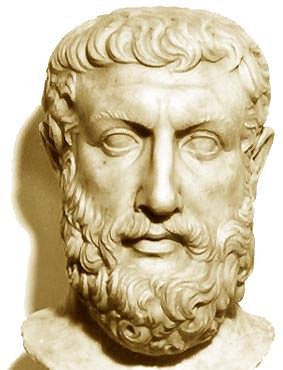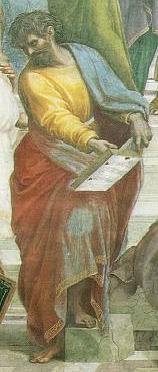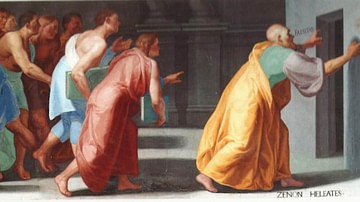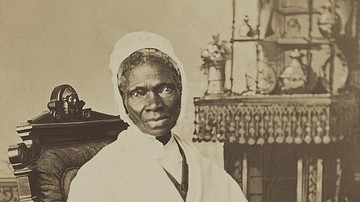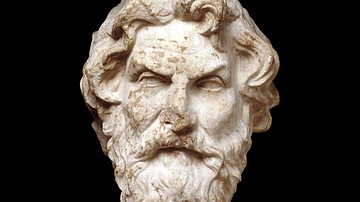Parmenides (l. c. 485 BCE) lived and taught in Elea, a Greek colony in southern Italy and is known as the founder of the Monist School (though it may have been founded by Xenophanes of Colophon, l. c. 570-478 BCE) which claimed all of reality is One. The observable world, Parmenides said, is actually uniform and singular (mono) in being.
People mistakenly believe that there is a difference between, say, a dog and a horse because they trust in their senses to perceive reality correctly and make judgments and arrive at conclusions based on perception. In reality, Parmenides claims, the dog and the horse - and the human and building and city and everything else - is all part of one singular, undifferentiated, reality which admits of no plurality. What people interpret as "the many" are only appearances which have been distorted by the senses. The actual essence of the dog, horse, and everything else is the same; these things only appear to be different to those who do not understand that their underlying form is the same.
He may have written a number of works on this subject but is best known for a fragment of a long poem, preserved by later writers, on the topic of the Path of Truth and the Way of Error, though the poem's original title has been lost. Parmenides' philosophy is said to have been difficult to understand and rejected by some audiences, necessitating his student, Zeno of Elea (l. c. 465 BCE) to write 40 logical paradoxes proving, mathematically, that change, motion, and any plurality was illusion and reality was uniform.
Parmenides' Philosophy
Parmenides was probably a student of Xenophanes of Colophon, though this has been challenged just as the claim of Xenophanes as the founder of the Eleatic School has. It is probable, however, that Parmenides did study with Xenophanes because Xenophanes vision of a single, all-powerful god, unlike human beings or human conceptions of deities, as well as the other fragments of his work arguing for a higher realm of understanding which is misinterpreted by human beings, is similar in many ways to Parmenides' vision.
Xenophanes claimed that people were mistaken about the nature of the gods and, so, the nature of the world, and Parmenides said the same, writing:
There is a way which is and a way which is not [a way of truth and a way of opinion]. There is not, nor will there be, anything other than what is since indeed Destiny has fettered it to remain whole and immovable. Therefore those things which mortals have established, believing them to be true, will be mere names: 'coming into being and passing away,' 'being and not being,' 'change of place'...(Robinson, 116)
Parmenides argues here that one may think the world one lives in is comprised of multiples but, in reality, it is One and unchanging. Reality, he insisted, had to be One because all things received their being and substance from it. The dog and horse, though they may appear different animals, participated in the form and function of living things, just as human beings did, and so, in essence, all three were the same. Nothing, he claimed, is capable of inherently changing in any significant fashion because the very substance of reality is immutable.
A contemporary of both Heraclitus (l. c. 500 BCE) and Socrates (l. c. 470/469-399 BCE), Parmenides's beliefs would contradict the former and influence the latter. Heraclitus based his philosophy on the concept of fire as the First Cause of existence and change as synonymous with life itself. Life, to Heraclitus, was change in that it was continually in motion, nothing was permanent, and one person or experience continually gave way to others. Parmenides rejected Heraclitus' argument as informed by the senses and so mistaken.
Parmenides' insistence on one ultimate Truth would significantly affect Socrates' young student Plato (l. 428-427-348-347 BCE), who developed Parmenides' monism through his own Theory of Forms and paid homage to the older philosopher by devoting three of his dialogues to Eleatic thought, the Parmenides, the Statesman, and the Sophist. In the Parmenides, Parmenides and his student Zeno of Elea come to Athens and instruct a young Socrates in wisdom and this, perhaps, is Plato's most direct acknowledgement of his debt to Parmenides' thought.
The Path of Truth
In the following passage, Parmenides poetically relates to a reader how all is One and that there is, indeed, a way which is and a way which is not, and to believe otherwise is simply to believe wrongly about the nature of the universe. As nothing can come from nothing, and 'being' is indestructible, the assertion that we are born from some other realm or that we die must be false impressions. The senses, according to the Eleatics, are not to be trusted to reveal the truth. Truth may only be recognized through reason.
This translation of Parmenides' famous poem is by Arthur Fairbanks, 1898. Here, Parmenides relates how he is conveyed by chariot to the gates of wisdom and the citadel of the goddess Sophia (wisdom). Sophia instructs him on the true nature of existence and admonishes him to remain on the path of truth no matter how his senses try to deceive him.
The horses which bear me conducted me as far as desire may go, when they had brought me speeding along to the far-famed road of a divinity who herself bears onward through all things the man of understanding. Along this road I was borne, along this the horses, wise indeed, bore me hastening the chariot on, and maidens guided my course. The axle in its box, enkindled by the heat, uttered the sound of a pipe (for it was driven on by the rolling wheels on either side), when the maiden daughters of Helios hastened to conduct me to the light, leaving the realms of night, pushing aside with the hand the veils from their heads.
There is the gate between the ways of day and night lintel above it, and stone threshold beneath, hold it in place, and high in air it is fitted with great doors; retributive Justice holds the keys that open and shut them. However, the maidens addressed her with mild words, and found means to persuade her to thrust back speedily for them the fastened bolt from the doors; and the gate swinging free made the opening wide, turning in their sockets the bronze hinges, well fastened with bolts and nails; then through this the maidens kept horses and chariot straight on the high-road.
The goddess received me with kindness, and, taking my right hand in hers, she addressed me with these words:—Youth joined with drivers immortal, who hast come with the horses that bear thee, to our dwelling, hail! since no evil fate has bid thee come on this road (for it lies far outside the beaten track of men), but right and justice. 'Tis necessary for thee to learn all things, both the abiding essence of persuasive truth, and men's opinions in which rests no true belief. But nevertheless these things also thou shalt learn, since it is necessary to judge accurately the things that rest on opinion, passing all things carefully in review.
Come now I will tell thee-and do thou hear my word and heed it-what are the only ways of enquiry that lead to knowledge. The one way, assuming that being is and that it is impossible for it not to be, is the trustworthy path, for truth attends it. The other, that not-being is and that it necessarily is, I call a wholly incredible course, since thou canst not recognise not-being (for this is impossible), nor couldst thou speak of it, for thought and being are the same thing.
It makes no difference to me at what point I begin, for I shall always come back again to this.
It is necessary both to say and to think that being is; for it is possible that being is, and it is impossible that not-being is ; this is what I bid thee ponder. I restrain thee from this first course of investigation; and from that course also along which mortals knowing nothing wander aimlessly, since helplessness directs the roaming thought in their bosoms, and they are borne on deaf and like-wise blind, amazed, headstrong races, they who consider being and not-being as the same and not the same; and that all things follow a back-turning course.
That things which are not are, shall never prevail, she said, but do thou restrain thy mind from this course of investigation.
And let not long-practised habit compel thee along this path, thine eye careless, thine ear and thy tongue overpowered by noise; but do thou weigh the much contested refutation of their words, which I have uttered.
There is left but this single path to tell thee of: namely, that being is. And on this path there are many proofs that being is without beginning and indestructible; it is universal, existing alone, immovable and without end; nor ever was it nor will it be, since it now is, all together, one, and continuous. For what generating of it wilt thou seek out? From what did it grow, and how? I will not permit thee to say or to think that it came from not-being; for it is impossible to think or to say that not-being is. What thine would then have stirred it into activity that it should arise from not-being later rather than earlier? So it is necessary that being either is absolutely or is not. Nor will the force of the argument permit that anything spring from being except being itself. Therefore justice does not slacken her fetters to permit generation or destruction, but holds being firm.
Either being exists or it does not exist. It has been decided in accordance with necessity to leave the unthinkable, unspeakable path, as this is not the true path, but that the other path exists and is true. How then should being suffer destruction? How come into existence? If it came into existence, it is not being, nor will it be if it ever is to come into existence. So its generation is extinguished, and its destruction is proved incredible.
Nor is it subject to division, for it is all alike; nor is anything more in it, so as to prevent its cohesion, nor anything less, but all is full of being; therefore the all is continuous, for being is contiguous to being.
Farther it is unmoved, in the hold of great chains, without beginning or end, since generation and destruction have completely disappeared and true belief has rejected them. It lies the same, abiding in the same state and by itself accordingly it abides fixed in the same spot. For powerful necessity holds it in confining bonds, which restrain it on all sides. Therefore divine right does not permit being to have any end; but it is lacking in nothing, for if it lacked anything it would lack everything.
Nevertheless, behold steadfastly all absent things as present to thy mind; for thou canst not separate being in one place from contact with being in another place; it is not scattered here and there through the universe, nor is it compounded of parts.
Therefore thinking and that by reason of which thought exists are one and the same thing, for thou wilt not find thinking without the being from which it receives its name. Nor is there nor will there be anything apart from being; for fate has linked it together, so that it is a whole and immovable. Wherefore all these things will be but a name, all these things which mortals determined in the belief that they were true, viz. that things arise and perish, that they are and are not, that they change their position and vary in colour.
But since there is a final limit, it is perfected on every side, like the mass of a rounded sphere, equally distant from the centre at every point. For it is necessary that it should neither be greater at all nor less anywhere, since there is no not-being which can prevent it from arriving at equality, nor is being such that there may ever be more than what is in one part and less in another, since the whole is inviolate. For if it is equal on all sides, it abides in equality within its limits.
At this point I cease trustworthy discourse and the thought about truth; from here on, learn the opinions of mortals, hearing of the illusive order of my verses.
Men have determined in their minds to name two principles; but one of these they ought not to name, and in so doing they have erred. They distinguish them as antithetic in character, and give them each character and attributes distinct from those of the other. On the one hand there is the aethereal flame of fire, fine, rarefied, everywhere identical with itself and not identical with its opposite; and on the other hand, opposed to the first, is the second principle, flameless darkness, dense and heavy in character. Of these two principles I declare to thee every arrangement as it appears to men, so that no knowledge among mortals may surpass thine.
But since all things are called light and darkness, and the peculiar properties of these are predicated of one thing and another, everything is at the same time full of light and of obscure darkness, of both equally, since neither has anything in common with the other.
Conclusion
The single path of truth which Sophia calls Parmenides to pursue is the path of unity and recognition of the underlying interconnectedness of all things. Toward the end of the poem, when he writes how "men have determined in their minds to name two principles" and, in doing so, have gone wrong, he highlights what he sees as the essential problem people have in perceiving reality: the belief in plurality.
As long as one sees one's self as distinct from everyone else, and each other person as their own entity, and the earth beneath one's feet as separate from one's self and others, and animals still more different than earth or people, one will be inclined to treat all things outside of one's self as separate, foreign, leaving the individual alone to navigate the world.
Understanding the essential Oneness of reality - how all people and animals and the earth and sky are of the same basic substance and connected on the deepest level - encouraged full participation of everyone in life because every seeming individual was not a lone entity but part of everything else.
